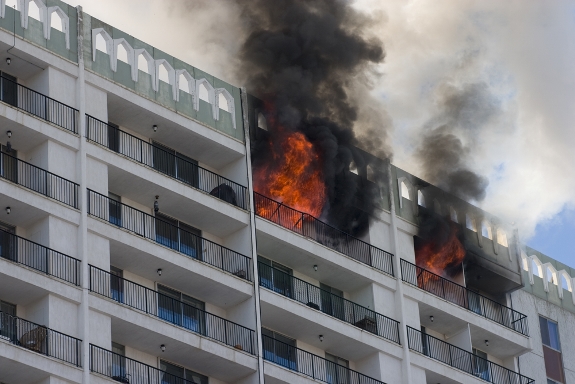The fire alarm goes off. You assume it’s a false alarm until you notice smoke. Your apartment building is on fire. Do you know what to do?
Apartment fires are frighteningly common. According to the National Fire Protection Association (NFPA), in 2016, 95,000 apartment fires caused property damage worth $711,000,000 and resulted in 325 deaths and 3,375 injuries.
When an apartment fire occurs, there’s no time to waste. Getting out safely is the top priority. Things can be replaced – people can’t.
- Before exiting, check the door knob. If it feels cool, you can exit. If the door knob feels hot, it is not safe to go through. Look for another exit route, such as the fire escape.
- If you are trapped, try to get help by calling 911 and by signaling for help at your window.
- Leaving doors and vents closed can help prevent the spread of fire and smoke. If you are trapped inside, you can also use towels and tape around doors and vents to keep smoke out.
- Take the stairs down. Don’t use an elevator during a fire.
- Smoke rises, so stay low to the ground.
- Once you’re out, don’t go back inside. If you think someone inside needs help, let the firefighters know.
Knowing what to do during an apartment fire is essential, but it’s also important to take precautions before a fire occurs.
Avoid these four exposures to minimize your risk of fire.
- Don’t leave your kitchen unattended while cooking. According to the NFPA, nearly half of all home structure fires are caused by cooking equipment.
- Be cautious when using heating equipment such as space heaters. Follow the manufacturer’s instructions and keep flammable objects away from heating equipment.
- Don’t leave candles burning when you’re out of the room or asleep.
- Make sure any cigarettes are properly extinguished, and never smoke when you are likely to fall asleep. Smoking materials are the leading cause of home fire deaths according to the NFPA.
Make sure you’re prepared for an apartment fire:
- Test your smoke alarms every month and replace the batteries every year. Don’t leave them disconnected. According to the NFPA, even though most homes have smoke alarms, most home fire deaths occur in homes with no working smoke alarms.
- Keep a working fire extinguisher handy.
- Know how you’ll get out. Keep in mind that visibility might be poor due to darkness and smoke.
- Have an emergency exit planned in case the front door is blocked. Make sure the fire escape is well maintained and that you can access it.
Take precautions to limit the damage caused by an apartment fire:
- Keep digital backups of important documents and precious family photos.
- Store irreplaceable items in a fireproof safe.
- Make sure you’re protected with insurance. If you rent, you need renters insurance to cover your personal belongings.

